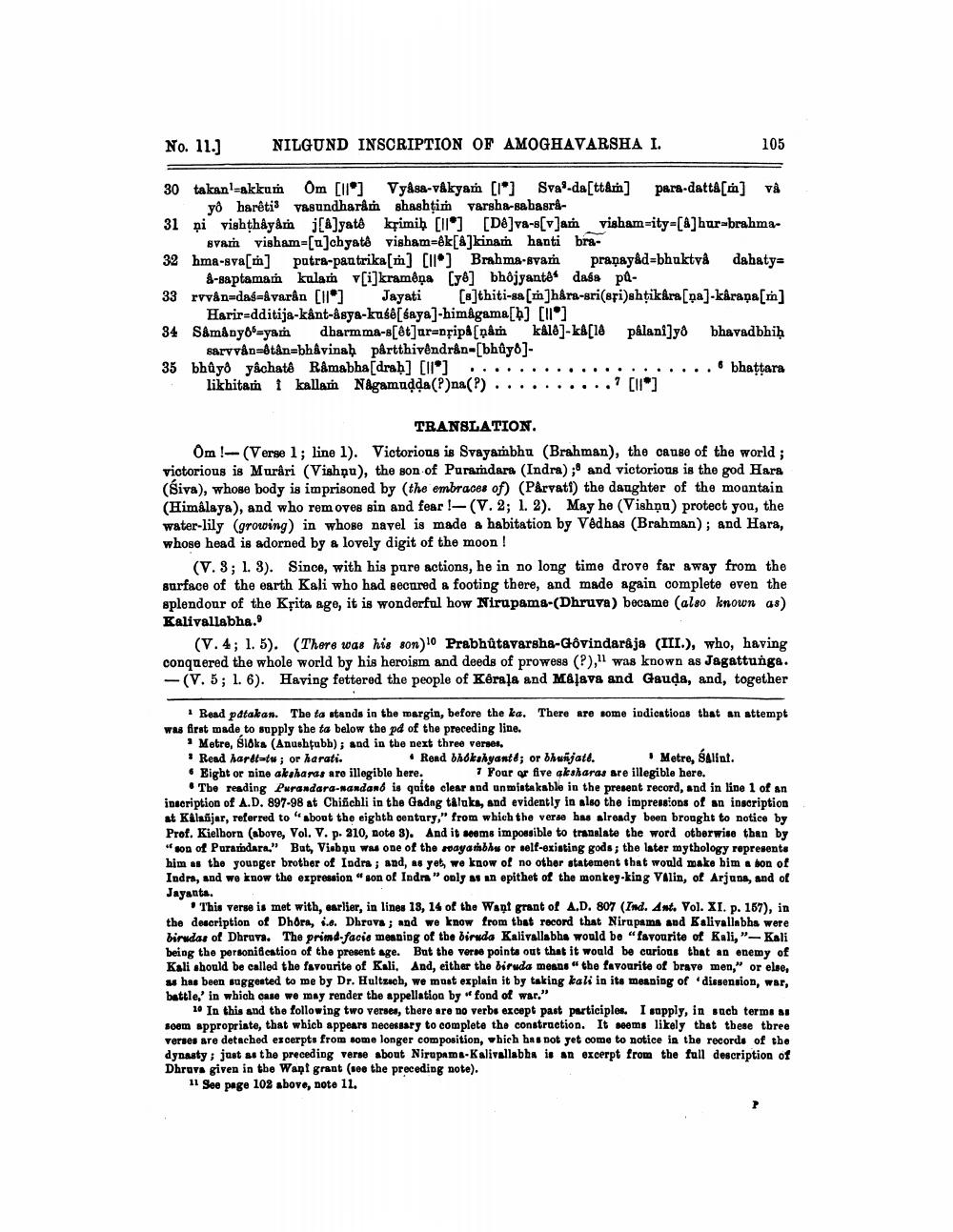________________
No. 11.)
NILGUND INSCRIPTION OF AMOGHAVARSHA I.
105
30 takan-akkun Om [ll] Vyåsa-vákyan [l*] Sva-da[tt&m] para-datta[m] vå
y harêti: Vasundharam shashtim varsha-sabasra31 ņi vishthåyåṁ [A]yatê krimiḥ [11*] [D8]va-s[v]an visham=ity=[A]hur-brahma
evam visham-[uJchyatê vigham=&k[&]kinan hanti bra32 hma-sva[m] patra-pantrika[m] [llo) Brahma-svam pranay&d=bhuktvå dahaty=
8-saptaman kulam v[i]kraméņa [y] bhôjyante* dass pa33 rvvån=das=&varân [11] Jayati []thiti-sa [m]hára-sri(spi)shţikára [ņa]-kâraņa[m]
Hariredditija-kånt-sya-kusê[saya]-himagama[h] [11] 34 Sámányoyan dharmma-s[ēt]ar-připa [ņam kald)-ka[18 pålani]y bhavadbhiḥ
sarv vån=ôtån=bhävinah pârtthivendran-[bhůy6]35 bhûyd yâchaté Råmabha (drah] [11"] .................... bhattara
likhitam i kallam Nagamudda(?)na(?)..........? [11]
TRANSLATION Om !-(Verse 1; line 1). Victorious is Svayambhu (Brahman), the cause of the world ; victorious is Murári (Vishnu), the son of Purandara (Indra); and victorious is the god Hara (Śiva), whose body is imprisoned by the embraces of) (P&rvati) the daughter of the mountain (Himalaya), and who removes sin and fear!-(V. 2; 1. 2). May he (Vishnu) protect you, the water-lily (growing) in whose navel is made & habitation by Vedhas (Brahman); and Hara, whose head is adorned by a lovely digit of the moon!
(V. 3; 1. 3). Since, with his pare actions, he in no long time drove far away from the surface of the earth Kali who had secured a footing there, and made again complete even the splendour of the Krita age, it is wonderful how Nirupama-(Dhruva) became (also known as) Kalivallabha.
(V. 4; 1. 5). There was his son) Prabhůtavarsha-Govindaraja (III.), who, having conquered the whole world by his heroism and deeds of prowess (?)," was known as Jagattunga. - (V. 5; 1. 6). Having fettered the people of Kerala and M&lava and Gauda, and, together
Read pdtakan. The ta stands in the margin, before the ka. There are some indications that an attempt was first made to supply the ta below the pd of the preceding line.
• Metre, Sloka (Anushtabb); and in the next three verses . Read hardt=t#; or harati. . Read bhókahyantd; or bhunjate.
Metre, Salint. • Eight or nine akahanas aro illegible here. 7 Four or five aksharas are illegible here.
• Tbe reading Purandara-Nandand is quite clear and unmistakable in the present record, and in line 1 of an inscription of A.D. 897-98 at Chinchli in the Gadng taluks, and evidently in also the impressions of an inscription at Kalaõjar, referred to "about the eighth century," from which the verse has already been brought to notice by Prof. Kielborn (above, Vol. V. p. 210, note 8). And it seems impossible to translate the word otherwise than by "son of Paramidara." Bat, Visbņu was one of the roayambhu or self-existing gods; the later mythology represents him as the younger brother of Indrs; and, as yet, we know of no other statement that would make bim a son of Indra, and we know the expression "son of Indna" only as an epithet of the monkey king Vilin, of Arjuns, and of Jayanta.
This verse is met with, earlier, in lines 13, 14 of the Want grant of A.D. 807 (Ind. Ant. Vol. XI. p. 157), in the description of Dhora, i.e. Dhruva ; and we know from that record that Nirupama and Kalivallabhs were biridas of Dhruvs. The prind-facic meaning of the biruda Kalivallabha would be "favourite of Kali,- Kali being the personification of the present age. But the verse points out that it would be curious that an enemy of Kali should be called the favourite of Kali, And, either the biroda means "the favourite of brave men," or else, w has been suggested to me by Dr. Hultzuch, we must explain it by taking kali in its meaning of dissension, war, battle,' in which case we may render the appellation by " fond of war."
10 In this and the following two verses, there are no verbs except past participles. I sapply, in such terms as soem appropriate, that which appears necessary to complete the construction. It seems likely that these three verses are detached escerpts from some longer composition, which has not yet come to notice in the records of the dynasty, just as the preceding verse about Nirapama-Kalivallabba is an excerpt from the full description of Dhruva given in the Want grant (son the preceding note).
11 See page 102 above, note 11.




